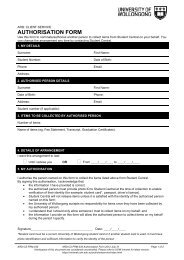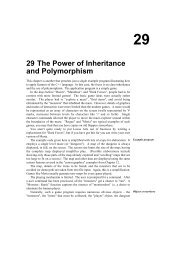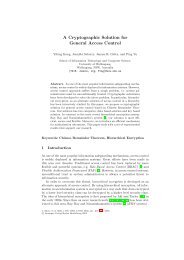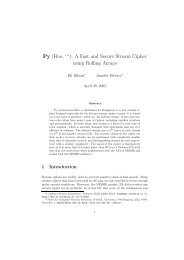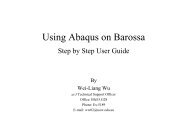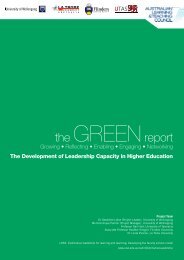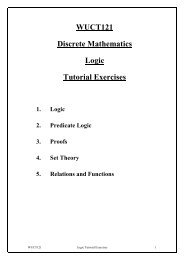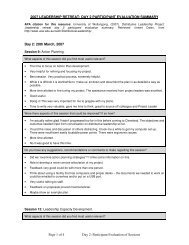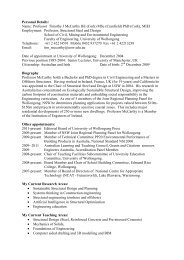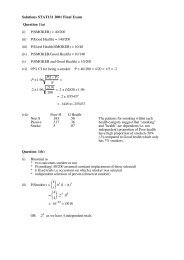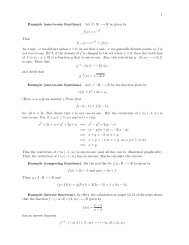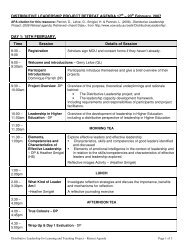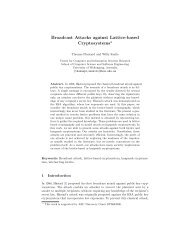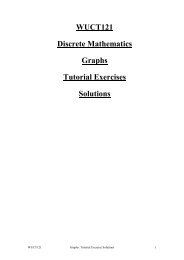india author m 1- a-nan - University of Wollongong
india author m 1- a-nan - University of Wollongong
india author m 1- a-nan - University of Wollongong
Create successful ePaper yourself
Turn your PDF publications into a flip-book with our unique Google optimized e-Paper software.
one <strong>of</strong> "East West encounter"; Sindi's quest is for peace and the meaning <strong>of</strong> life, not for<br />
cultural roots. The thematic concerns <strong>of</strong> this novel indicate that Joshi is interested in more<br />
deeply universal human problems than the East-West theme, as his later novels show.<br />
SRINATH, C.N. "Crisis <strong>of</strong> Identity: Assertion and Withdrawal in Naipaul and Arun Joshi"<br />
The Literary Criterion 14.1 (1980):33-41. Reprinted in The Literary Landscape Delhi:<br />
Mittal Publications, 1986: 60-69.<br />
SRINATH, C. N. "The Fiction <strong>of</strong> Arun Joshi: The Novel <strong>of</strong> Interior Landscape." The<br />
Literary Criterion 12, nos.2-3 (1976): 115-33. Reprinted in The Literary Landscape<br />
(Delhi: Mittal Publications, 1986): 40-59.<br />
Leavisite. Presents evaluations <strong>of</strong> Joshi’s first three novels in terms <strong>of</strong> theme and<br />
treatment. Srinath examines various aspects--characterization, structure, and language. The<br />
Foreigner shows a remarkable degree <strong>of</strong> maturity and technical competence in its original<br />
treatment <strong>of</strong> the theme <strong>of</strong> east-west encounter. The protagonist <strong>of</strong> The Strange Case <strong>of</strong> Billy<br />
Biswas, Joshi's second novel, is aware <strong>of</strong> a region beyond the frontiers <strong>of</strong> ordinary human<br />
consciousness. Joshi's craftsmanship is excellent. Billy realizes that the price <strong>of</strong> making the<br />
choice (he disappears from civilized urban society) is terrible, but the price <strong>of</strong> not making it is<br />
even more terrible. Ratan Rathor, in The Apprentice, shows the price paid for not choosing-moral<br />
corruption. Joshi's sense <strong>of</strong> the concrete, and his eye on situation a character, enable<br />
him to avoid the pitfalls <strong>of</strong> a thesis novel. Rathor is Everyman, and his story reveals the utter<br />
degeneration <strong>of</strong> modern Indian society.<br />
SRINATH, C. N. "Crisis <strong>of</strong> Identity: Assertion and Withdrawal in Naipaul and Arun Joshi."<br />
The Literary Criterion 14, no.1 (1980): 33-41. Reprinted in The Literarv Landscape (New<br />
Delhi: Mitt Publishers, 1986): 60-69.<br />
Compares V.S. Naipaul's A House for Mr Biswas and Arun Joshi's The Strange<br />
Case <strong>of</strong> Billy Biswas. The central theme <strong>of</strong> both novels is the crisis <strong>of</strong> identity; in Naipaul, the<br />
crisis is one <strong>of</strong> assertion, the supreme manifestation <strong>of</strong> which is Mr Biswas wanting to acquire<br />
a house. Naipaul successfully presents a protagonist who is detestable but dignified and gains<br />
our sympathy. In Joshi's novel, the crisis manifests itself in surrender to primitive forces. Billy<br />
Biswas, a Ph.D in anthropology from an American university, son <strong>of</strong> a Supreme Court judge,<br />
renounces his entire past, his parents, wife and child, to lead the life <strong>of</strong> a tribal in the forest.<br />
Joshi makes Billy's action credible by showing us his seemingly eccentric but inwardly rich life<br />
through his letters to his girl friend Tuula, and the way he argues with his father about judging<br />
people who act under extraordinary circumstances. Both novels are distinguished by the<br />
appropriateness <strong>of</strong> their styles that suit the nature <strong>of</strong> the tensions <strong>of</strong> their central characters.<br />
SRIVASTAVA, RAMESH K. "The Theme <strong>of</strong> Alienation in Arun Joshi' Novels." Ken:<br />
Journal <strong>of</strong> English Studies and Creative Writing 1 (1982-3): 13-24. Reprinted in Six Indian<br />
Novelists in English (Amritsar: Guru Nanak Dev <strong>University</strong>, 1987): 311-25.<br />
Shows how Joshi’s protagonists are alienated from society, family and self. Sindi Oberoi<br />
learns the need for right action as well as detachment through the deaths <strong>of</strong> his friends; Billy<br />
Biswas finds his true self in primitive nature; Ratan Rathor compromises with society and<br />
realises the futility <strong>of</strong> inauthentic life. Joshi uses animal images to show disaffected inner states.<br />
He is not necessarily detached from society, since his depiction <strong>of</strong> its evils is a sign <strong>of</strong> social<br />
concern.



